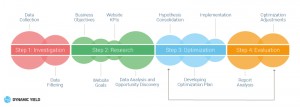 Most people aren’t born experts at sales or customer management. Creating and maintaining rapport with customers requires training and practice, but those who stand out in these areas have something under their belts beyond carefully following the instruction of their managers. These people have mastered the art of intuition: a natural ability or power that makes it possible to know something without any proof or evidence, as defined by the Merriam Webster Dictionary While Merriam Webster includes the word ‘natural,’ professionals disagree; Intuition is not something that only those who are born with have. It is a skill anyone can develop.
Most people aren’t born experts at sales or customer management. Creating and maintaining rapport with customers requires training and practice, but those who stand out in these areas have something under their belts beyond carefully following the instruction of their managers. These people have mastered the art of intuition: a natural ability or power that makes it possible to know something without any proof or evidence, as defined by the Merriam Webster Dictionary While Merriam Webster includes the word ‘natural,’ professionals disagree; Intuition is not something that only those who are born with have. It is a skill anyone can develop.
“Intuition is nothing more and nothing less than recognition.” Miller Heiman
Often times intuition and measurable data are seen as two completely unrelated channels. Some professionals swear on numbers while others say it’s all about judgment. In reality, the two ideas flow from the same stream: experience. Data comes from experience and intuition comes from experience, which is to say that with the right knowledge, anyone can take advantage of experience to sharpen their intuition and perform at a higher level.
Steve Martin, author of Heavy Hitter Selling: How Successful Salespeople Use Language and Intuition to Persuade Customers to Buy, says building intuition is about developing mental habits—one of those being the ability to detect different “thought modalities.” Thought modalities are like learning styles: visual, auditory, or kinesthetic. Observe how your clients react to different presentations; do they prefer phone calls over emails? (auditory) graphs and charts over numerical or text-based facts? (visual) frequent in-person meetings with anecdotal evidence? (kinesthetic) Quickly recognizing a customer’s modality will help you understand them better and foster long relationships with them.
Both mental and physical habits should be well-recorded. Martin says that all successful sales representatives “continually catalog their successes and failures. They store patterns of individual and company behavior and link them to the sales process, using those experiences to guide them through interactions with different types of people and sales situations.” Much of intuition is about finding patterns and acting upon them. Howard Tullman, CEO of 1871, recommends seeking specific patterns in each customer in addition to those across multiple customers. This requires a great deal of attention. “I’m talking about becoming a stone-cold expert on each client’s procurement process and internal timing and planning cycles so you know how to be there when the customer is ready to buy,” he says.
Finding patterns can be made easier for teams through software that measures data and automatically analyzes it to produce simple reports that are easy to understand. Some field activity management software allows reps to collect and record data regarding past client visits, consumer observations, future scheduled meetings, etc. When utilizing such software, remember to only measure what matters; more is not necessarily better. Measuring irrelevant metrics can waste time and harm productivity.
As we said earlier, experience translates to sharper intuition. If you don’t have as much experience though, Peter Gasca of Entrepreneur says that there’s a way to catch up to those who are seasoned professionals. Read up! As simple as this sounds, not enough people do it. We’re all ‘too busy.’ So there’s the first step: make time. Even just 20 minutes every night before bed equates to about 60 additional hours of knowledge in just half a year. Gasca says to create a folder of your favorite bookmarked sales/business websites and blogs. In addition to reading, take advantage of the comment box at the end of each article to stay engaged and interact with other readers.
Tuning into the details of your interactions with customers and recognizing patterns will turn regular occurrences into great opportunities. One of the best ways to impress your clients is to know what they need before they know they need it. When working with clients, stay attentive and take good notes. Intuition is something that comes with time and practice, but once you master it, your interactions with clients are sure to run more smoothly, helping you get ahead of the game.
Business & Finance Articles on Business 2 Community(114)
Report Post








